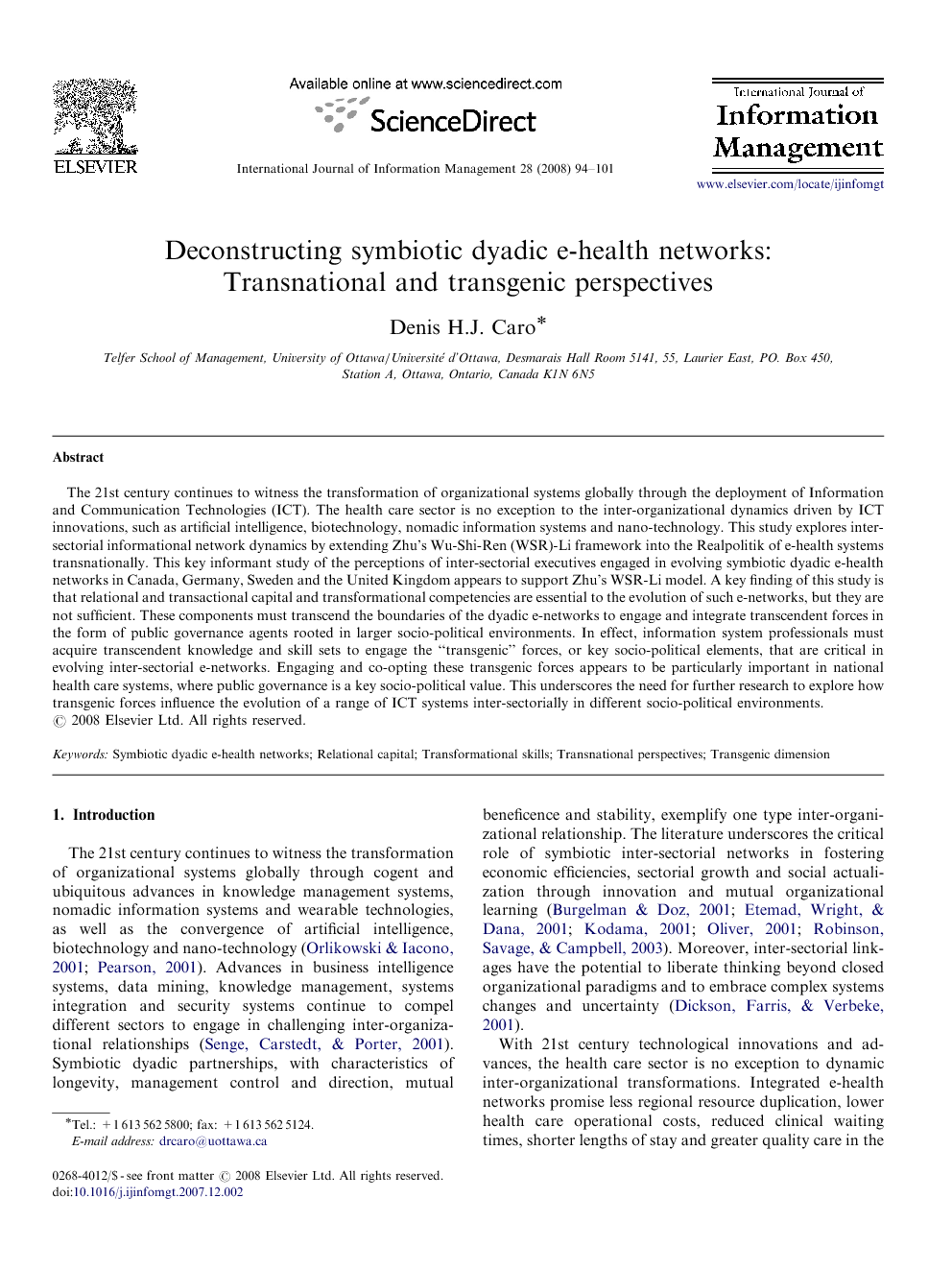The 21st century continues to witness the transformation of organizational systems globally through the deployment of Information and Communication Technologies (ICT). The health care sector is no exception to the inter-organizational dynamics driven by ICT innovations, such as artificial intelligence, biotechnology, nomadic information systems and nano-technology. This study explores inter-sectorial informational network dynamics by extending Zhu's Wu-Shi-Ren (WSR)-Li framework into the Realpolitik of e-health systems transnationally. This key informant study of the perceptions of inter-sectorial executives engaged in evolving symbiotic dyadic e-health networks in Canada, Germany, Sweden and the United Kingdom appears to support Zhu's WSR-Li model. A key finding of this study is that relational and transactional capital and transformational competencies are essential to the evolution of such e-networks, but they are not sufficient. These components must transcend the boundaries of the dyadic e-networks to engage and integrate transcendent forces in the form of public governance agents rooted in larger socio-political environments. In effect, information system professionals must acquire transcendent knowledge and skill sets to engage the “transgenic” forces, or key socio-political elements, that are critical in evolving inter-sectorial e-networks. Engaging and co-opting these transgenic forces appears to be particularly important in national health care systems, where public governance is a key socio-political value. This underscores the need for further research to explore how transgenic forces influence the evolution of a range of ICT systems inter-sectorially in different socio-political environments.
The 21st century continues to witness the transformation of organizational systems globally through cogent and ubiquitous advances in knowledge management systems, nomadic information systems and wearable technologies, as well as the convergence of artificial intelligence, biotechnology and nano-technology (Orlikowski & Iacono, 2001; Pearson, 2001). Advances in business intelligence systems, data mining, knowledge management, systems integration and security systems continue to compel different sectors to engage in challenging inter-organizational relationships (Senge, Carstedt, & Porter, 2001). Symbiotic dyadic partnerships, with characteristics of longevity, management control and direction, mutual beneficence and stability, exemplify one type inter-organizational relationship. The literature underscores the critical role of symbiotic inter-sectorial networks in fostering economic efficiencies, sectorial growth and social actualization through innovation and mutual organizational learning (Burgelman & Doz, 2001; Etemad, Wright, & Dana, 2001; Kodama, 2001; Oliver, 2001; Robinson, Savage, & Campbell, 2003). Moreover, inter-sectorial linkages have the potential to liberate thinking beyond closed organizational paradigms and to embrace complex systems changes and uncertainty (Dickson, Farris, & Verbeke, 2001).
With 21st century technological innovations and advances, the health care sector is no exception to dynamic inter-organizational transformations. Integrated e-health networks promise less regional resource duplication, lower health care operational costs, reduced clinical waiting times, shorter lengths of stay and greater quality care in the face of pressing care provider and clinician shortages. Symbiotic e-health networks continue to be the transformational wave in health care systems internationally (Adewale, 2004; Sahney, 2003). Health care executives have yet to fully understand the transformational power of Information and Communication Technologies (ICT) to promote delivery efficiencies and enhance quality of care through inter-organizational interactions. This paper posits a conceptual model based on a key informant study of perceptions of international ICT and health care executives of the pragmatic issues in evolving symbiotic dyadic e-health networks. The study findings and implications underscore future directions for information management research transnationally.


